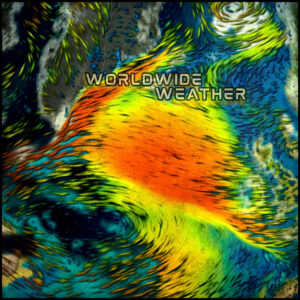With a sound like Ben Watt or Robert Wyatt glimpsed through the wrong end of a pollen-dusted telescope, Joe Woodham’s new record ‘Worldwide Weather’ provides an opportunity to understand our ultimate impermanence and irrelevance in the face of nature, writes Alistair Fitchett.

‘All change is good change.’ So says artist Joe Woodham in the press release for his Worldwide Weather album on None More Records. It would be a bold statement at any time, but perhaps particularly so now, and especially in connection with weather and its relationship to the interconnectedness of the oceans and the moon. Intrigued by these relationships, Woodham has made a record that explores the emotional resonances set off by our exposure to nature’s systems whilst seeking to leave a minimal imprint. This in itself feels like a comforting acknowledgement of human frailty, a rare glimpse of secular piety in a species that seems condemned to consider its existence as fundamentally Important. Woodham knows this is a fallacy but makes no song and dance about it. This is deliciously secretive.
Accompanying the record are a couple of photographs that show Woodham standing by the sea’s edge brandishing a recording device that looks like a denuded umbrella. Wrapped in waterproofs he looks like some peculiar Canute figure who has discovered Poseidon’s trident on the foreshore. The field recordings made through this trident/umbrella may provide a core wash to the album, but they feel neither overbearing nor merely decorative. Instead, they are textural glimpses of half-remembered meditations; promises of enlightenment flickering in the salty flecks of waves breaking and reforming. These ambient sounds blend with analogue tape loops, Woodham crafting them together with lines of guitar and bass to create an improvisational space that breathes with the softness of a Hiroshi Sugimoto photograph.

Photo: Freddie Willatt @stax_of_pentax
As already hinted at, this is music that feels like it has been made by an artist trying to make as few marks as possible, traces of existence all but erased like a de Kooning drawing rubbed out by Rauschenberg. It is ephemeral music that paradoxically sounds rooted in ancient folk traditions. It’s all a little reminiscent of Ultramarine — from both their earthy United Kingdoms period and the more translucent entries in the newly minted Send and Return set — and that of course is some mighty company to be keeping. Woodham himself suggests influences from the likes of Polar Bear, Andrew Wasylyk and Pharaoh Sanders, and those realms of spiritually transfiguring jazz and ambient exploration are indeed sound touchstones. There is something here that also puts me in mind of epic45 and July Skies’ pastoral meanderings; ghostly footsteps in landscapes/seascapes that are never quite all there, endlessly shifting and spiritually elusive. ‘All change is good change’. Well, yes, perhaps.
Bookended by ‘Forecast’ and ‘Overcast’, two pieces with mirrored angular refrains which Woodham suggests ‘introduce and close the album’s atmospheric themes, both musically and conceptually’, the album includes tracks like single ‘Spring Tide’, where an ache builds to a euphoric, soaring release and then ebbs to evaporation; ‘Walrus’, with a forlorn cry of guitar gently weeping on a bed of shefallying shingle like Kerouac serenading the heavenly bodies, or vice-versa; the night-time seclusion of ‘In Syzygy’ with its clipped guitar puncturing synth waves and subliminal ocean rumbles, notes in conjunction and opposition suggesting the pulse and pull of invisible energies. Close your eyes and it’s almost possible to hear them whispering: ‘All change is good change.’ Hymnal. Quietly, almost casually seductive.
My personal favourite though is ‘Longshore Drift’, a song that appropriately slips along languorously on a picked acoustic guitar atop which Woodham sings gently through a field of static, a folk song for the ghosts of tomorrow. It recalls Ben Watt and Robert Wyatt glimpsed through the wrong end of a telescope, a thin layer of pollen dust spread on the eyepiece. Captivating.
Worldwide Weather then is perhaps a considerate but determined sidestepping of Bigger Issues around climate change and the influence of the human hand on nature and is all the better for that. Its 33-minute duration is a pause for breath, an opportunity to dissolve into moments and to understand our ultimate impermanence and effective irrelevance in the face of nature. All things must pass. Everything will end. ‘All change is good change.’ A bold, but essentially gentle statement, then. Amen.
*
‘Worldwide Weather’ is out now on None More Records, available digitally or on vinyl here.